#siege of constantinople
Text

The Last Stand of Emperor Constantine XI in the Fall of Constantinople
by Christa Hook
#constantine xi#emperor#constantinople#art#fall#siege#history#europe#european#christianity#christian#byzantine#byzantines#byzantium#roman#romans#eastern roman empire#ottoman empire#ottoman#ottomans#turks#armour#sword#fall of constantinople#roman empire#greek#greece#mediterranean#constantine XI dragases palaiologos#christa hook
40 notes
·
View notes
Photo

The Ottomans' final assault on the walls of Constantinople, as painted by Jose Daniel Cabrera Peña
Constantine XI Palaiologos
#art#Ottomans#Byzantine empire#Constantinople#Istanbul#Mehmed II#Constantine XI Palaiologos#military history#siege battle
27 notes
·
View notes
Text
so three body is more listenable after getting thru the first few pages, and not hard to follow after watching the tencent show which was rly faithful to the book. but tbh death's end is so up my alley, my fav writing style, an episodic collage of interconnected perspectives and moments, giving a glance of each time period throughout human history, from the past to the far future, as we unlock more and more of the universe. i love it
#i'm actually reading the ebook bc i don't wanna miss anything#the way it starts with the siege of constantinople lol#kinda reminiscent of cloud cuckoo land but it's chronological#3bp
4 notes
·
View notes
Text
If you've ever read about the fall of Constantinople, you will have heard that the Ottoman's managed to break through its impenetrable walls because someone forgot to lock one of its gates. But, is that really true?
#Constantinople#Turkey#walls#Byzantine#Ottoman#Mehmed II#siege#myth#Istanbul#Constantine#ancient#history#ancient origins
30 notes
·
View notes
Video

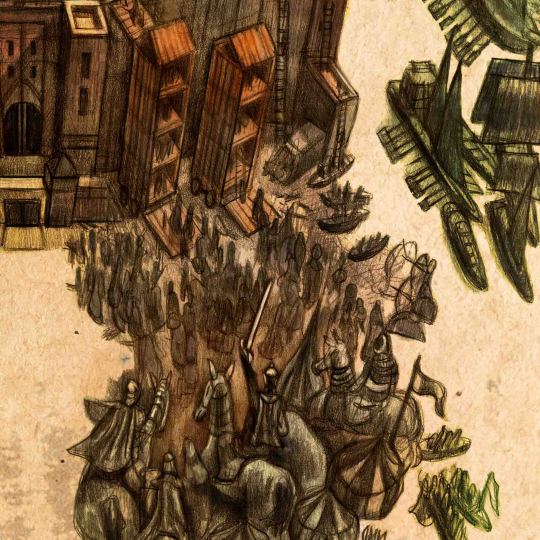
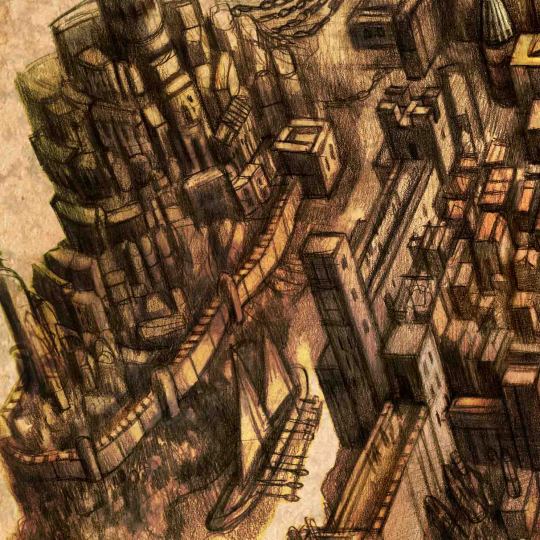
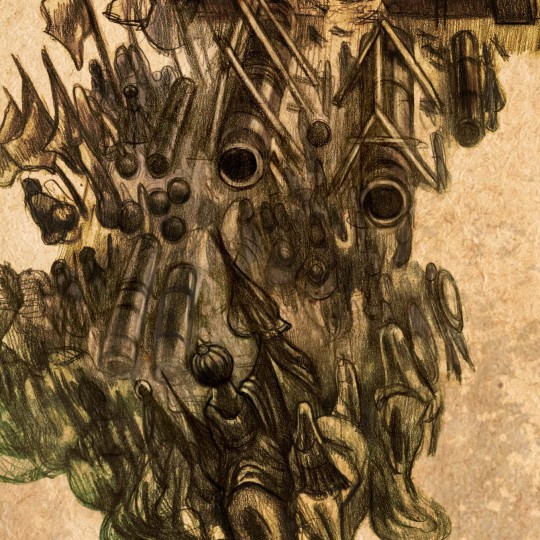
Constantinople
by Darío Mekler
Queen of the cities. Capital of the eastern roman empire. All times and events occuring simultaneously.
Hagia Sophia (the head) at the center being transformed into a mosque by the adding of minarets after its conquest. (I´ll be animating the movement in a coming up animated version) A chained golden horn and the Galata tower at its right arm (left of the image). The circus maximus and the port at its left arm (right of the image). The defense of the city at the center from a column of crusaders at the right and a column of ottoman troops at the left.
Floating over the city Constantine, Justinian, Theodora, St Helen (Mother of Constantine).
... and some byzantine discussions spread throughout.
Graphite and digital color
www.instagram.com/dariomekler
#constantinople#istambul#turkey#cityscape#ancient city#history#ancient history#byzantine#byzantium#dariomekler#hagia sophia#crusade#siege#justinian#constantine#theodora#Illustration#history illustration
8 notes
·
View notes
Text
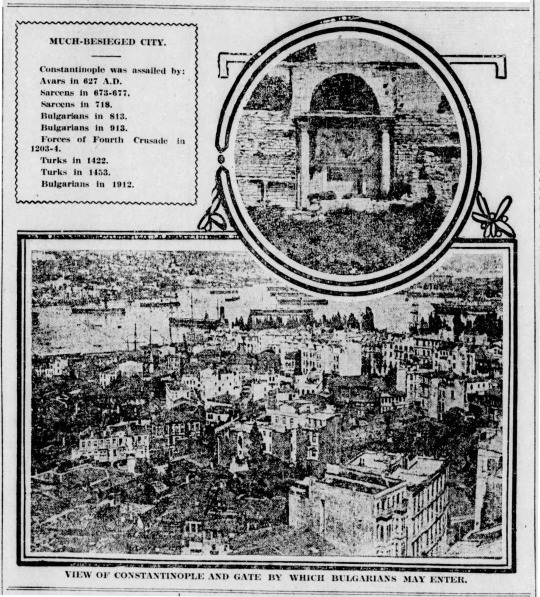
"MUCH-BESIEGED CITY." Vancouver Sun. November 18, 1912. Page 1.
----
Constantinople was assailed by:
Avars in 627 A.D.
Sarcens in 673-677,
Sarcens in 718.
Bulgarians in 813.
Bulgarians in 913.
Forces of Fourth Crusade in 1203-4.
Turks in 1422.
Turks in 1453.
Bulgarians in 1912.
VIEW OF CONSTANTINOPLE AND GATE BY WHICH BULGARIANS MAY ENTER.
#constantinople#istanbul#ottoman empire#city under siege#first balkan war#balkan wars#kingdom of bulgaria#fall of the ottoman empire
1 note
·
View note
Text
How to Rule an Empire and Get Away With It by K. J. Parker - Book Review
K. J. Parker is a master of voice. His Siege Trilogy accents this mastery, providing the reader with narrators with personalities large enough they threaten to drown out most other voices. How to Rule an Empire and Get Away With It, the middle book in this trilogy, has to contend with a difficult task: offering a worthy follow-up to the ironic, cynical voice of the first book’s protagonist Orhan.…
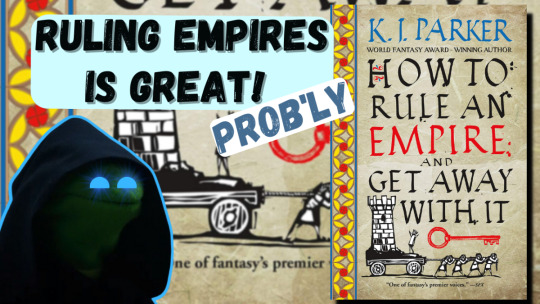
View On WordPress
#book blog#book review#character development#Constantinople#cynicism#Fantasy#fiction#How to Rule an Empire and Get Away With It#humor#irony#K. J. Parker#leadership#literature#narrative voice#politics#responsibility#siege#Siege Trilogy#theatre#Writing
1 note
·
View note
Text
Today I learned the name California originally came from a series of fictional books written in the early 1500s by a Spaniard called Garci Rodriguez de Montalvo, in which it was an island near to the lost Garden of Eden (which floated away during Noah's flood, never to be found again). The books were so popular that when the Spaniards got to what they first thought was an island*, they named it after the place in the books.
The island in these books was full of naked Amazonian warriors and trained griffins and gold was the only metal to be found there. Montalvo called it California because the queen of these women was called Calafia, who led her army of gold-armored ladies to fight alongside the Muslims at the siege of Constantinople until later converting to Christianity. This name Calafia is thought to have been chosen to sound like a female version of the Muslim leader, the Caliph.
And so, at least etymologically, California is the last surviving Caliphate.
--------------
* Weirdly, California was consistently listed as an island on European maps for around 200 years, and no-one seems to know why.
111 notes
·
View notes
Photo
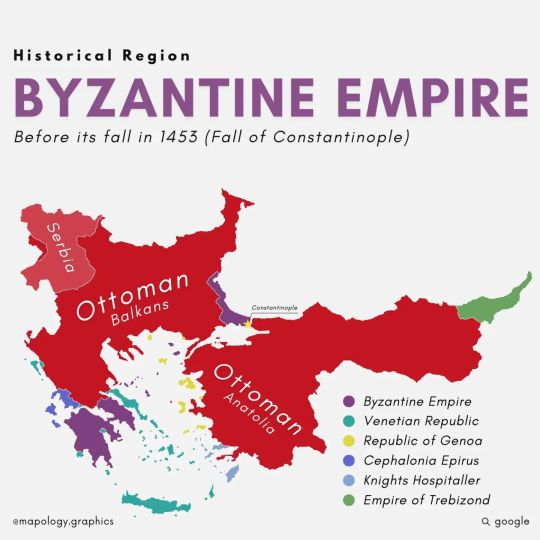
Byzantine Empire, 1453.
by mapology.graphics
During the siege of Constantinople in 1453, Byzantium desperately tried to defend its capital. Emperor Constantine XI, aware of the weaknesses of his fortifications and the lack of adequate resources, sought help from European Christian states, but received only limited help.
Finally, on May 29, 1453, Byzantium was unable to stop the Ottoman forces. The city was captured and Emperor Constantine XI died in the battle. The fall of Constantinople marked the end of the Byzantine Empire and closed a major chapter in Byzantine history.
126 notes
·
View notes
Text
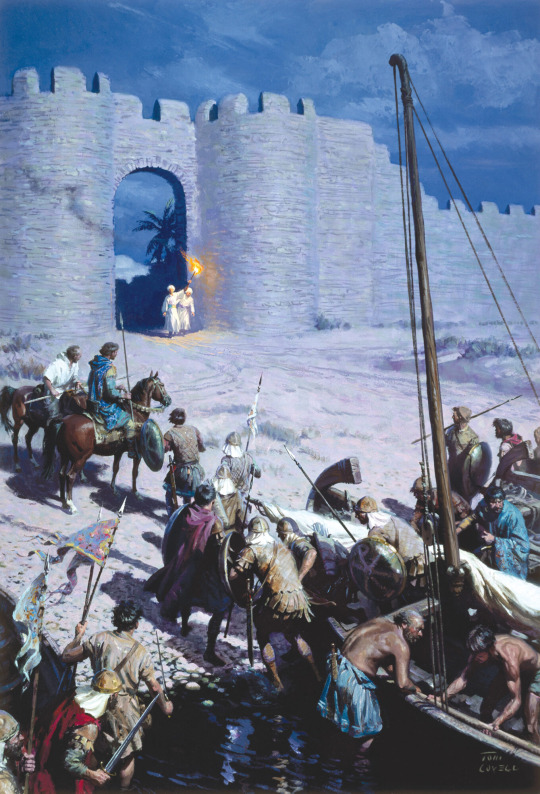
Byzantine Soldiers Sneaking Into Walled City Of Nicaea
by Tom Lovell
#siege of nicaea#art#tom lovell#byzantine#soldiers#byzantium#first crusade#crusades#crusade#medieval#middle ages#history#christianity#christian#nicaea#siege#fortress#castle#byzantine empire#constantinople#seljuk#turks#manuel boutoumites#walls
98 notes
·
View notes
Text

In War With Time
@flashfictionfridayofficial prompt - "take my hand"
Constantinople, 1204
Hands over his ears, Aziraphale pressed back into the corner. He slid down the stone wall and to the rug. Shivering, he squeezed his eyes shut.
Screams echoed outside, and he hunched his shoulders, covering his ears more tightly. That muffled the noises, the agonized cries and clash of swords. The sounds of a city being sacked.
He ought to be used to this by now. Over his thousands of years on Earth, he’d certainly seen plenty of war. And long ago, when he wielded a flaming sword, he’d been in battle himself.
But no. He never got used to it.
He huddled tighter, frozen in place. Couldn’t afford to move, to risk drawing attention. Maybe if he stayed still, no one would notice him. They might simply pass him by.
The door banged open, loud enough that he heard it even with his hands clamped over his ears. He snuck a quick peek without moving, and whimpered. One of the crusaders stood over him, in blood spattered armor, wielding a dripping sword. The man smiled, raised the sword—
And then crumpled. A different figure stood in the door, a figure dressed in tightly fitted black clothing. Unmistakable.
And yet, how could Crowley possibly be here now? Must be a hallucination, wishful thinking.
The hallucination’s lips moved, but Aziraphale couldn’t make out the words. He just stared, everything spinning, confusion roiling inside him. Had he been hit in the head, and simply didn’t remember? Or was this due to shock?
But even if it was merely a hallucination, he wanted to hear what Crowley had to say. Slowly, he uncovered his ears.
“We need to go, now. It’s not safe here.” Crowley—or the hallucination—looked around quickly, then stuck out a hand. His other hand clutched a broom, which must be what he’d hit the crusader with. If this was happening. “Come on, angel.”
Aziraphale just stared. Perhaps none of this was happening. He’d wondered if he was having a bad dream when the crusaders first laid siege to what was undeniably a Christian city, and this was simply more proof. It didn’t make any sense for these people to be attacking Constantinople, any more than it did for Crowley to be in the middle of a war zone, trying to save him. All imaginary.
“Aziraphale!” Snarling, Crowley stepped closer. “Look, I know you’re in shock or something, but there’s no time for you to be in shock. Take my hand.”
Aziraphale stared at the extended hand. He couldn’t move.
“Look at me, angel,” Crowley said, voice suddenly much softer. It was so shocking a change that Aziraphale automatically met his gaze across the top of dark glasses. Intense golden eyes gazed into his. “That’s it, at me. It’s Crowley, I’m right here. I need you to trust me, and do as I say. Take my hand.”
Trust him? A demon?
Dazed, Aziraphale took his hand. Crowley pulled him to his feet, then towards the door. Aziraphale resisted a little, not wanting to go anywhere near the screams, and Crowley sighed. “I get it, okay? I don’t wanna go out there either. But I’m gonna stop time, and that’ll make it a little better.”
Aziraphale managed a nod. Crowley snapped his fingers, and the world ground to a halt around them.
Having time stopped did make it a little better. As they rushed through the city, Aziraphale kept his eyes fixed firmly on Crowley. He only caught glimpses of the siege. People frozen while fleeing, assailants chasing them with weapons raised. Bodies in the streets. Flames, oddly still.
By the time they made it out of the city and into a small boat, Crowley was struggling for breath. As soon as they were afloat, he waved a hand. The screams resumed, far off in the distance.
Wheezing, Crowley slumped over against the side of the boat. Aziraphale took his hand again—he’d let go only so they could get the boat underway—and squeezed. “Crowley? Crowley?”
“M’ okay. Just… exhausted.” Weakly, Crowley squeezed back. “Takes a lot out of me, keeping time stopped for that long. You all right, angel?”
“Um. Better, now.” Still a bit dazed, Aziraphale glanced back towards Constantinople. Rather a lot of it was on fire, smoke billowing into the air. But as they drifted downstream, he couldn’t hear the screams anymore. “Awfully sorry about, well… thinking you were a hallucination. The entire thing was just awfully confusing.”
Crowley cracked an eye open. “You thought I was a hallucination?”
“I’m afraid so.” And oh, he still did not feel very well. Shaky, he moved to sit close beside Crowley, pressing to his side. “I-I thought perhaps I was imagining the whole thing, really. The crusaders wanted money, it seems, but that they would actually attack the city that first sought their help…”
“Nnnh, yeah. Humans for you. Sometimes, they’re terrific. Other times…” Groaning, Crowley straightened up a little. He brought his free hand up, stroking damp curls off Aziraphale’s brow. “You looked bloody terrified. Did they hurt you?”
“No. I managed to hide.” Guilty wrenched through Aziraphale’s tummy at that. “I suppose I was a bit of a coward.”
“Nah, you weren’t. For my money, it’s better not to get stabbed.”
Aziraphale found it difficult to disagree with that. But he was still confused about one thing. “What were you doing here, anyway? I know you weren’t on assignment to observe the war. You’re supposed to be in England.”
Crowley flushed slightly. He looked away, over the water, and sighed. “Came to get you.”
He said it quietly, so quietly that for a moment Aziraphale thought he’d imagined that, too. But he hadn’t, and he managed a faint smile as he curled up against Crowley’s side to rest.
35 notes
·
View notes
Text
Once again thinking about the fact that IRL Dracula's younger brother fucked Mehmed II and converted to Islam and acquired the moniker "Radu the Handsome/Fair". Yeah I listened to 2 hours about the final siege and fall of Constantinople today and it reminded me about Dracula's younger brother having gay sex with the Ottoman sultan
#The Draculas had a lot going on. Just like. Interpersonally#Please know there is an anime design in my head about the brothers Dracula at the Ottoman court
25 notes
·
View notes
Text
A documentation of the Sortie of Missolonghi, 1826 from the Ottoman perspective
If you follow certain Greek blogs here or Greek history closely, perhaps you know by now that the Greek War of Independence (also known as the Greek Revolution) is a paramount historical period in the collective Greek conscience and certainly the most formative for the emergence of the finally statutory Greek national identity. Furthermore, it is also a major historical event of the Romantic Period, playing a significant role in the fall of empires, the establishment of democratic institutions but also the rise of ethnic states. While all this is not well known nowadays abroad, at its time it affected a considerable part of the world and it also birthed the biggest and most notable Philhellenic movements. West Europe studied and explored the pre- and post-revolutionary Greek world extensively. Nevertheless and maybe unsurprisingly, Turkey, the state descendant of the Ottoman Empire, never shared the sentiment. The Greek Revolution is rarely if ever discussed in Turkey and in Turkish schoolbooks it is presented as a minor revolt of ungrateful subjects that could not potentially harm the status of the mighty empire (that entirely dissolved a century later). The truth is that Turkey has an enormous archive of Ottoman documentation regarding the Greek revolution but there is no intention so far for it to be examined thoroughly and properly.
Here is however a letter, written by Netzip Efendi (hope this is written correctly), a representative of the pasha of Egypt to Constantinople after he was sent to Missolongi, to witness the siege of the city and ensure the cooperation of the Egyptian soldiers with the Ottoman Turks [context: Egypt was then a part of the Ottoman Empire and as such, Egyptian soldiers were sent to assist in the fights against the Greek revolutionaries]. This is a recollection of the events of 10 April 1826 (hence why I am posting this today), the day of the Sortie of Missolonghi, again, from an Ottoman perspective:
"The unbelievers [the Greek Christians] had fortified Missolongi so well that it was impossible to conquer it by assault. Although the islands Vasiládi and Anatolikó - the key to access Missolonghi - were taken and the isolation from land and sea was complete, for about fifteen days, there was still supplementation passing with small boats from Petalás island, as the natural landscape around Missolonghi made this possible. However, the Austrian consul in Préveza [the Austrian Empire had good relations with the Ottoman Empire and was opposed to the Greek Independence struggle] informed Ibrahim pasha and he shut those passages with fortifications, cannons and soldiers. When it was clear the bandits [the Greeks] were exhausted by the starvation, they were offered an amnesty several times according to the Sharia Law. But when they were given the document with the conditions of Ibrahim and Reşid Mehmed [who was known in Greece as Kioutahís and was ironically and tragically of Greek Orthodox descent...!] pashas, where they were explaining the procedure for the amnesty and they were annoucing the Sultan's mercy and grace, the bandits [Greeks] expressed their animosity and disdain with arrogant words, saying: 'We cannot surrender our seven thousand blood-stained weapons with our own hands'. They were hoping that supplies and soldiers would still arrive to support them and indeed thirty-five to forty boats with bandits showed up and a ruthless combat against the Imperial Navy commenced and lasted for two days. Thankfully, they weren't able to cause any harm to the Imperial Navy, even with their fire ships, while they suffered many losses and retreated towards the straits of Zakynthos and Petalás islands. The bandits in Missolonghi were then in despair. A muslim captive who fled from Missolonghi transferred to us the information that on Saturday sunset, the fourteenth day of Ramadan [10 April 1826] there would be even more reinforcements for the besieged coming from the mountains north of Missolonghi, behind the rear of our army, and then there would be a signal and the unbelievers inside Missolonghi would take their women and their children and they would all together launch out of the city. Immediately we took all necessary measures. Indeed, on Saturday evening, there were movements detected on the peaks of the mountains and a little later the bandits with their women and children exited from the eastern coast of Missolonghi. Since there were Egyptian soldiers on that side, when the Greeks attempted to pass through the fortifications, our soldiers confronted them with bravery and persistence, hitting them with the artillery and the rifles. Some of the unbelievers could not proceed farther and returned to Missolonghi, while others, ignoring their losses, ran towards the mountains but our soldiers followed them and slaughtered them on the way. During the sortie of the unbelievers the sky was cloudy. However, after their sortie, by Allah's grace, the clouds were gone and the moonlight was as strong as sunlight. At that moment, Colonel Hussein Bey of the 7th Order of the Egyptians launched with swords inside Missolonghi, through the fortifications in the sides from which the unbelievers had appeared. The bandits had placed gunpowder inside holes they had dug inside the city, and given that the windmill in the harbour of Missolonghi was a fortified stronghold, they had placed gunpowder there as well, and about three hundred unbelievers were trapped there too. At the dawn of Sunday, as they were lighting up the gunpowder and blowing up the holes, the sound of the explosions was relentless. Most of the bandits were blown up, very few were killed by the swords of our soldiers but our soldiers were allowed to pillage women, children and fortunes. Glory to Allah, it was a big victory. 1,734 pairs of ears were collected by the army of Ibrahim Pasha and 1,015 pairs collected by the army of Reşid Pasha, a sum of 2,749 pairs of ears were sent to Constantinople to be displayed and set an example."
Sources: Kathimerini newspaper, excerpt taken from the article written by Şükrü Ilıcak, Doctor of History in Harvard University and postdoctoral researcher at the Institute of Mediterranean Studies and Aristides Hatzis, professor of Philosophy and Methodology of Law in the National Kapodistrian University of Athens, with the assistance of Anna Athanasouli, PhD candidate of History in the University of Crete.
The stats of the battle according to Wikipedia:

#greece#history#greek history#modern greek history#greek independence war#greek revolution#missolonghi#sterea hellas#aetolia-acarnania#central greece#mainland#sortie of missolonghi
17 notes
·
View notes
Photo
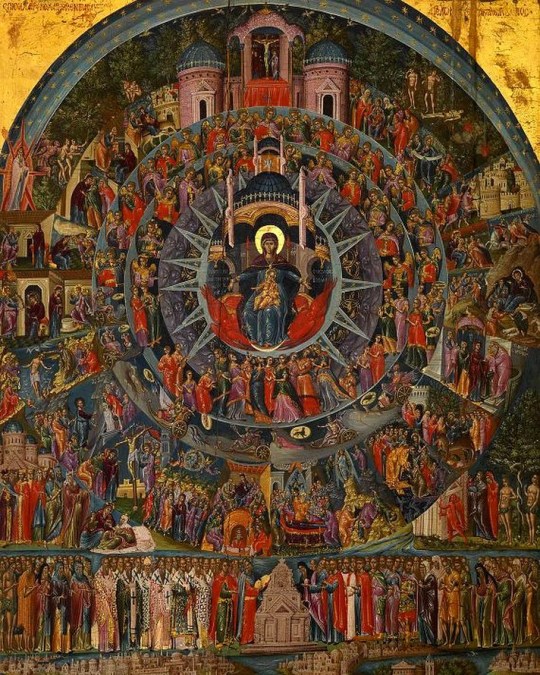
On the fifth Saturday of Great Lent, we celebrate the Akathist to the Most Holy Theotokos. For the first four Fridays of Great Lent, a service called the Salutations of the Theotokos is held. This set of hymns was composed in the early 300s describing the various life events of the Theotokos, but was officially chanted as a part of Great Lent in the early 600s when the the city of Byzantium (later known as Constantinople, and now Istanbul) was considered the Queen City and the heart of Christianity after the fall of the Roman Empire. Because of its ideal location, the city was often besieged by enemies. At one point in the early 600s, the city was surrounded by enemies who wanted to sack the city. This particular siege was different and it lasted a few months because all the fighting-aged men were away at war with the Persians. All that was left in the city were the priests, women, children, and the elderly. With no way of defending themselves, they all ran to the main church of Constantinople, in a place called “Blachernae” which is dedicated to the Most Holy Theotokos. The people stayed up all night praying to God and the Theotokos, asking for deliverance from their enemies. The Patriarch Sergius of Constantinople gathered all the priests and they endlessly marched around the inside city walls for days on end, holding the Icon of the Theotokos of Blachernae and chanting the hymn below. Then a miracle occurred. Unexpectedly, a huge storm arose with tidal waves and cyclones, and all the enemy's’ fleet was destroyed or turned back. Thus the city was saved. That night, all those in the city (who were still in the church) began chanting the Salutations, while adding the new hymn “To Thee the Champion Leader” or in Greek, "Ti Ypermaho". They chanted this the whole night without sitting down, and thus on the fifth Friday of Lent, the whole service is changed and is called the Akathist (i.e. the not sitting hymn). May the Most Holy Theotokos intercede for us that we might complete the remainder of Great Lent in prayer and repentance + #akathist #theotokos #salutations #prayer #constantinople #orthodox (at Constantinople - Κωνσταντινούπολη) https://www.instagram.com/p/CqeGNqrjEId/?igshid=NGJjMDIxMWI=
93 notes
·
View notes
Text
Being neurodivergent at the siege of Constantinople
20 notes
·
View notes